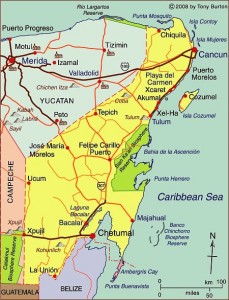Is mass tourism a form of colonialism or imperialism? This, essentially, is the question thoughtfully considered by Denise Fay Brown of the University of Calgary in her article, “Tourists as colonizers in Quintana Roo, Mexico”, published in the Summer 2014 issue of The Canadian Geographer.
Brown draws on decades of personal ethnographic fieldwork related to Maya spatiality and sociospatial organization in the Yucatec Maya zone, Quintana Roo. She argues that tourists, albeit unwittingly, are increasingly able (financially and in terms of ready access) to engage with “exotic landscapes”, but that their presence in such landscapes “results in the reterritorialization of the destinations that mimics the colonial enterprise.” In particular, in Quintana Roo, she claims that “an important segment of the landscape of the Yucatec Maya people has been appropriated and reterritorialized.” (How many tourists visiting Cancún and the so-called Riviera Maya region realize that this coast was largely terra incognita fifty years ago?)
One of the classic indicators of colonialism is spatial appropriation. Maya infighting aside, the earliest attempts at spatial appropriation in Quintana Roo were by Spain during early colonial times in the early sixteenth century. Even after independence in 1821, the Yucatán Peninsula resisted integration with the rest of the (new) nation. This resistance was not only due to cultural differences, but also to the Yucatán Peninsula’s location in the periphery, a long way from the seat of power in Mexico City. Indeed, despite the massive program of railway building that helped consolidate other parts of Mexico during the late nineteenth century, a rail link from central Mexico to the Yucatán Peninsula was only finally put in place in the 1950s.
Brown makes the case that the assault on Maya territory has continued into recent times, even if, “Today, it is not the conventional notion of nation state colonialism but a much more subtle invasion brought about by the ability of tourists from richer nations to travel south.”
She makes a strong argument that the growth of tourism in the Yucatán Peninsula has been “predatory” and that foreign tourists, especially those engaging in mass tourism, are, in fact, unwitting colonizers.
Brown concludes that, “The case of Quintana Roo, Mexico illustrates how the tourist can be seen as a pawn in a larger political project. Exposure of this predatory nature of tourism reveals processes that have implications for other Native regions of the Americas and beyond that are suffering similar “invasions.””
Thinking about the extent to which tourism is just one more manifestation of colonialism adds a whole new dimension to traditional tourism studies looking at economic, social and environmental advantages and disadvantages. Brown’s argument is persuasive, and, clearly, the political and cultural impacts of tourism deserve equal consideration.
Reference:
- Denise Fay Brown. 2014. “Tourists as colonizers in Quintana Roo, Mexico”, The Canadian Geographer, vol 57, #2, Summer 2014, pp 186-205.
Related posts:
- The resort city of Cancún continues to grow (Apr 2014)
- The growth of Cancún, Mexico leading tourist resort (Feb 2010)
- Beach erosion in the tourist resort of Cancún, Mexico (Dec 2010)
- Ecological footprints, marine conservation and Cancun’s underwater sculpture park (Feb 2013)
- Artificial reef near Cancún doubles as an underwater art gallery (Mar 2012)
2 Responses to “Quintana Roo, Mexico: Is mass tourism a form of colonialism?”
Sorry, the comment form is closed at this time.

I remember in the mid seventies staying at a nice European owned hotel in the Caribbean. It was one hundred or so dollars a day. The woman that was the hotel bar tender told me she earned twenty dollars a month. She was unhappy ini her job, no doubt knowing how much the Hotel owner was making and how little she was making.
She also told me that if she quit, there would be a lineup of people who would take her job.
I also encountered serious hostility from local islanders, when I strayed off the main road on a car trip.
This experience abruptly woke me up to the truth about who benefits and who doesn’t, from tourism in poor countries.
It’s always valuable to reexamine our beliefs, ideas and misconceptions!